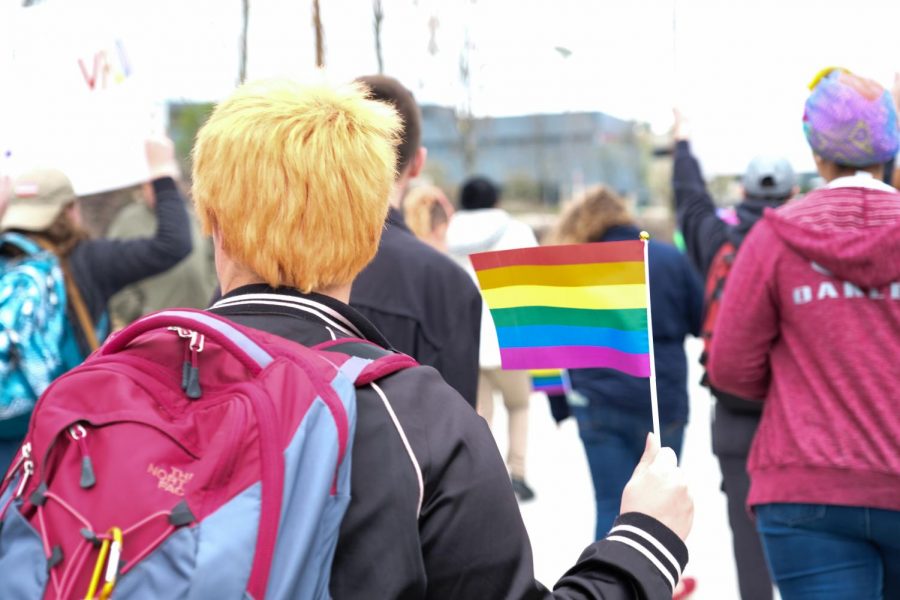Your donation will support the student journalists of Northern Kentucky University. Your contribution will allow us to purchase equipment and cover our annual website hosting costs.
File photo. Students walk through NKU’s campus to celebrate Pride Week.
Chase Law professor’s brief helps guide Supreme Court decision
June 23, 2020
Before Jack Harrison was a professor at Chase College of Law, he worked as an attorney at a large law firm and handled product liability and employment litigation. Self-described as a “fairly visible gay guy,” Harrison said he would often have members of the LGBTQ+ community reach out to him to represent their case of discriminatory termination of employment.
The discrimination could have even been flagrant, according to Harrison. The employer could have explicitly said, “The reason I’m firing you is because you’re gay and I don’t like gay people.”

When they presented their evidence to Harrison, the former employee would ask: “What can we do?”
“The reality was, given the state of the law in Ohio, Kentucky, [other] states right around us, there wasn’t very much they could do,” Harrison said. “There wasn’t really much legally that the employee could do to seek a remedy.”
But that reality changed on June 15, 2020.
Members of the LGBTQ+ community now have protection under the federal law against discriminatory termination of employment, as decided in a landmark U.S. Supreme Court case last week. In Bostock vs. Clayton County, the U.S. Supreme Court held in a 6-3 ruling that an employer who fires an individual merely for being gay or transgender violates Title VII of the Civil Rights Act of 1964.
During its consideration of the case, the court invited outside parties to file amici curiae (Latin for “friends of the court”), which are summary briefs that outline arguments for either upholding or overturning the appellate court decision.
Religious groups and corporations submitted briefs that argued both sides of the issue. Harrison currently serves as the chair of the sexual orientation and gender identity section of the American Association of Law Schools, so he had an opportunity to collaborate with a few other law professors and one historian to draft and submit their own brief.
When Chief Justice Neil Gorsuch published the majority opinion in the court’s ruling, Harrison was delighted.
Gorsuch’s argument was very similar to the one he co-wrote.
The argument
The Civil Rights Act of 1964 states that an individual cannot be terminated from employment on the sole basis of “race, color, religion, sex, or national origin.”
According to Harrison, his brief argued on behalf of the LGBTQ+ employees from a textualist perspective, which means to narrowly define the language used in the act. Within the act, they focused on the term “sex” as outlined in Title VII. Historically, this section has been used to protect women from discrimiantion in the workplace, but it has since broadened to encompass gay, lesbian, bisexual, transgender and queer workers.
“We argued [to] focus on the text of Title VII—What does ‘on the basis of sex or because of sex’ in the statute mean?” Harrison said.
All members of the LGBTQ+ community are protected by the Civil Rights Act because of this terminology, according to the U.S. Supreme Court ruling.
“For example, you have John and Jane, and they’re both employees. John dates women; Jane dates women,” Harrison said. “If Jane is fired for dating women and John is not, then that’s discrimination on the basis of sex. You’re treating similarly situated employees differently, and that is clearly covered under the language of Title VII: ‘on the basis of sex.’”
Some may be surprised by Gorsuch’s similar argument written in the majority opinion. Gorsuch was the first justice to be nominated to the Supreme Court by President Trump and has a reputation of siding with conservatives on issues.
But he is also a strict textualist, Harrison said, and that was paramount in this case.
“This was not a decision that was based on ideology or culture,” Harrison said. “This was really simply about the language of the text.”
While this is considered a massive achievement, Harrison warned that members of the LGBTQ+ community cannot always entrust language to grant protection.
“Textualism looks awfully good today, but it can really go the other way tomorrow in a case we really care about,” Harrison said.
Further legal implications
According to Harrison, this decision and Gorsuch’s wording in the majority opinion could have far reaching effects on other aspects of federal law.
“What it did was make it very clear that the language is similar or the same in other statutes. As those cases come forward, it’s going to be very difficult for courts, including the Supreme Court, not to read it exactly the same way that Justice Gorsuch did,” Harrison said.
It could even impact the rule that the Trump administration issued earlier this month allowing transgender people to be discriminated against in healthcare.
“Again, it’s similar language,” Harrison said.
Harrison said he hopes that transgender people will also be afforded more respect in the legal system. In Bostock vs. Clayton County, one of the employees was Aimee Stephens, a woman who was fired from R. G. & G. R. Harris Funeral Homes after she sent a letter to her employer that detailed her intention to begin presenting as female at work.
In his majority opinion, Gorsuch used Stephens’ current name and pronouns following her transition. After a long history of misgendered language and “dead-naming” (using the birth name of a transgender person without their consent) transgender individuals, Harrison said he hopes that other judges will follow Gorsuch’s practice.
Though this is a historic case for the LGBTQ+ community, Harrison acknowledged that the legal system still allows other discriminatory behavior.
For example, in Kentucky and Ohio, members of the community can still be denied public accommodations such as hotels.
Though the journey for LGBTQ+ civil rights in the United States is far from finished, at least it is a step in the right direction, according to Harrison.
“It at least puts a good decision out there with good analysis for cases going on in the future,” Harrison said.

